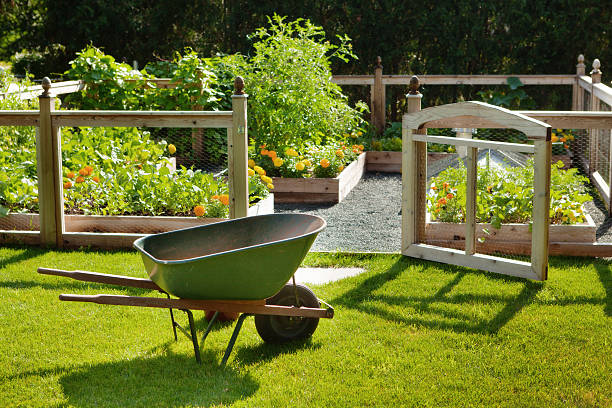
Remember your grandmother’s garden-vibrant with color, and perhaps a few chubby caterpillars inching their way along leaves? For some gardeners, the bugs that called a potager garden home would find them groaning. But never fear, there is a balance that can be achieved between lush greens and those relentless little squatters. No, avoiding chemicals is not utopian; rather, it can be real, if one knows a thing or two about using some highly effective old-fashioned remedies.
Before showing how to shoo away roaches and beetles, let’s delve into something nobody ever mentions: bugs have hobbies, too. Sure, they do love those long walks through your garden, but they have their taste preferences, as well. Mint and marigold keep them away. They are the uninvited crashers to the party; plant those flowers around your vegetables, and they’ll watch the pests give orders.
Now, consider coffee-well, not for you, though who doesn’t love a great cup o’ Joe? Coffee grounds around the base of your plants, some sort of invisible barrier. Snails and ants don’t like crossing a barrier with caffeine laced in it; it’s almost like one opens up a bug café and puts up a “not welcome” sign.
Now, something a bit more pungent: Garlic and peppers don’t have to simply make Grandma’s hot sauces hot. Mash a few cloves in, add some chili powder to taste, combine the two with a bit of water, and then let the mixture sit overnight. Spray this concoction on the afflicted plants. Pests will be running for cover faster than one can say “Scoville scale.” Courtesy of nature and a little kitchen ingenuity, your garden is one vast hostile environment.

Ever use a decoy? Plant a sacrificial plant a distance away from those most prized of crops of yours. Bright-colored, bright nasturtiums attract aphids away from your lettuce, busy with other toys. That is a diversion tactic, and sometimes it is great to be a strategist.
Think of your dirt: Healthy dirt is like a healthy immune system. Put compost on it, or worm castings. Healthy dirt full of microbes will automatically prevent an invasion of pests and diseases. It is like a spa treatment but for a garden. With regular attention and affection, pests and diseases will be sent on their merry way without permanent guests.
Now, for a garden aid: birds. Attracting the correct flying friends with a strategically placed birdhouse or feeder might just result in fewer insect problems. Birds do eat insects as part of their normal diet; your garden can be an all-you-can-eat buffet. Just be prepared for their less-than-charming activity: fruit vandalism.
Companionship is not only for humans. Some plants do have very positive influences on one another. Planting basil near tomatoes will keep your little red beauties thriving while having to worry less about pests. Rosemary acts much like a personal bodyguard to many plants. Who needs pesticides when nature’s thriving community rolls up its sleeves to lend a hand?
Garden Allies: How Companion Plants Guard Your Potager Garden
Ah, the potager garden: the long-ago way when gardening became an art form, tucking vegetables, fruits, and flowers in cozily together. It’s the dinner party where all the guests not only get along but thrive. Now, let me introduce some boisterous garden guests who come with special talents-companion plants that naturally repel pests with all the finesse of a highly-skilled waiter passing around hors d’oeuvres.
First, there is the marigold-as bright and colorful as a Mardi Gras parade. Besides adding brilliance to the garden, these golden beauties have a secret weapon in the root system: a chemical called alpha-terthienyl, which sends a rapid ‘no trespassing’ signal to nematodes. The worm pests detest it. Stick marigolds around your tomatoes, and watch them live securely while the little critters make a hasty retreat.
It’s like that one weird uncle that tells ghost stories to keep the relatives away. Just this one allium does not just keep the vampires away but the aphids, ants, and Japanese beetles at bay. Plant them around rose bushes or under fruit trees. Garlic emits a putrid scent of sulphur compounds that serves as a strong repellent. You get the picture-the bugs are running for the hills.
Basil is one companion which no planting can ever be complete without. I mean, this aromatic herb is Leonardo DiCaprio popular! Basil freshens up pasta dishes in addition to repelling mosquitoes and flies. Planting basil near peppers and tomatoes gets you a little garden paradise that, well, is about as formidable as a gladiator inside the arena.
Lavender is like that one calm friend in the crew who just smells so good and steals people’s hearts, except for moths, fleas, and mosquitoes. Such a great aromatic plant is good for lining pathways and borders in gardens. The soothing aroma of these plants is an escape room for them, where they are always left thinking which way further.
Consider borage-the humblest of heroes-but let us staircase dive this plant into the spotlight. The star-shaped flowers of blue color raise not only the aesthetic appeal but also attract bees and wasps that can be considered Sherlock Holmes squads investigating undesirable intruders in the garden. Plant this plant near your strawberries for a mutualistic relationship: your strawberries love them, but the pests don’t!
And then there’s thyme benefits: as timeless as some classic novel, this herb takes on poor cabbage worms and whiteflies, intimidating them into second-guessing their intended garden mischief. Thyme whispers silently across the soil, sort of like some silent security patrol deterring invaders well before they know they have crossed a line.
Finally, bring on the nasturtiums: this peppery salad addition can double nicely as an aphid trap, drawing the little critters away from your prize veg. Plant nasturtium decoys near cucumbers, cabbages, or at the base of fruit trees. Aphids will go so in love with the nasturtiums, going there like it could be the latest club in town, they won’t give your prize vegetable produce a second look.



